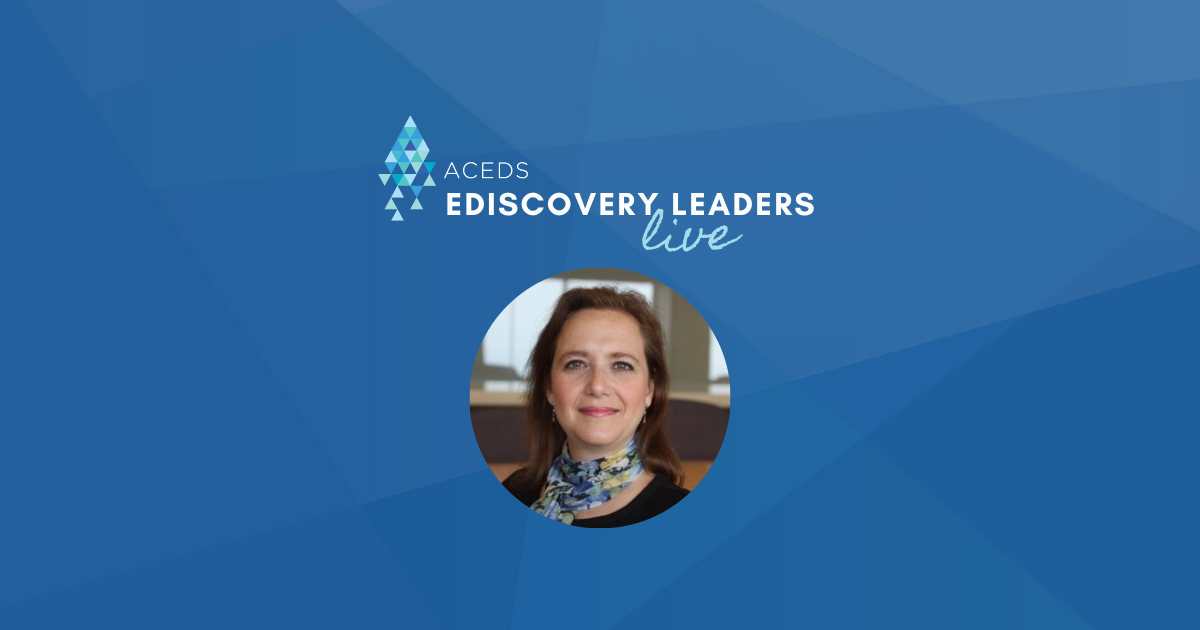eDiscovery Leaders Live: Kelly Friedman of Borden Ladner Gervais
Kelly Friedman, Senior Counsel & National Leader – Beyond eDiscovery at Borden Ladner Gervais LLP, joins George Socha, Senior Vice President of Brand Awareness at Reveal, for ACEDS #eDiscoveryLeadersLive, broadcast from the Master’s Conference in Toronto.
An experienced litigator with unique expertise in data management issues, including eDiscovery, cybersecurity, and privacy, Kelly is recognized for her eDiscovery expertise and leverages over two decades of litigation experience to bring a distinctively strategic approach to planning and executing discovery projects. Kelly was part of the consultant team that designed the Ontario Energy Board’s cybersecurity framework for electricity distributors and transmitters. She regularly provides training to boards of directors and executives on how to understand and implement privacy and cybersecurity best practices. Kelly has appeared before administrative bodies such as the Ontario Energy Board, all levels of court in Ontario and the Supreme Court of Canada.
Kelly talked about the value experience as a litigator can bring to eDiscovery practices, offered guidance for eDiscovery practitioners who haven’t litigated cases, and advocated for the adoption in Canada of eDiscovery special masters.
Key Highlights
-
- [1:06] Introducing Kelly.
- [1:30] How Kelly got into eDiscovery and became the go-to eDiscovery lawyer in her firm.
- [6:40] Joining BLG.
- [7:08] Data as evidence, not just as data.
- [8:30] Admissibility of evidence in a fake-news world: thinking ahead to better prepare for handling evidence produced from artificial intelligence.
- [10:26] The great value a background as a litigator can bring to eDiscovery.
- [11:50] What non-litigator eDiscovery professionals have to offer.
- [12:36] How to be heard as an eDiscovery professional without litigation experience.
- [14:02] Advice to external vendors on how to work effectively with law firm personnel.
- [14:21] And bringing perspective to a role as an internal vendor to a litigation team.
- [14:39] The intertwining of litigation and eDiscovery strategies.
- [15:07] Get out of your silo, develop the right interest, and ask the questions that need to be asked.
- [16:35] The struggles courts and parties face with AI-generated data: the truth is going to be under fire.
- [19:15] Are eDiscovery special masters the answer?
Key Quotes
- “You have to not think of this as data…. Instead, this is potential evidence that is going to make or break the case. Don’t think of it as data; think of it as evidence…. It’s the litigator first in me.”
- “Often, I would give options [about eDiscovery issues] and say, ‘If this was my case, I would go about it this way,’ and that has a lot more weight when you litigated for over 20 years.”
- “What the litigators don’t realize is that ‘non-litigator eDiscovery professionals] see so many different types of litigation and different types of evidence and documents that they do have a lot to offer.”
- “I think [eDiscovery professionals who don’t have litigation experience] should try to become part of the litigation team – not think of themselves as just an adjunct to the litigation process, like I come in, I do my bit, I give you the information and you deal with it – but find out what the case is about, get involved in the information governance strategy of the clients so you can give better advice on collection, etc.”
- “eDiscovery strategy has to be in sync with the overall litigation strategy. Litigation strategy changes, and the eDiscovery strategy might have to adapt to that. They feed one another. What you learn in the context of eDiscovery strategy can change the whole litigation strategy and vice versa.”
- “I don’t think it’s wise for anybody in the eDiscovery space to think they could be in a silo and just do their thing. Not to say you have to know everything about everything because there are experts to handle that, but you need to start thinking, ‘What are the facts here? Who are the people, and what’s the real impact of this “data”?’”
Connect with Kelly

